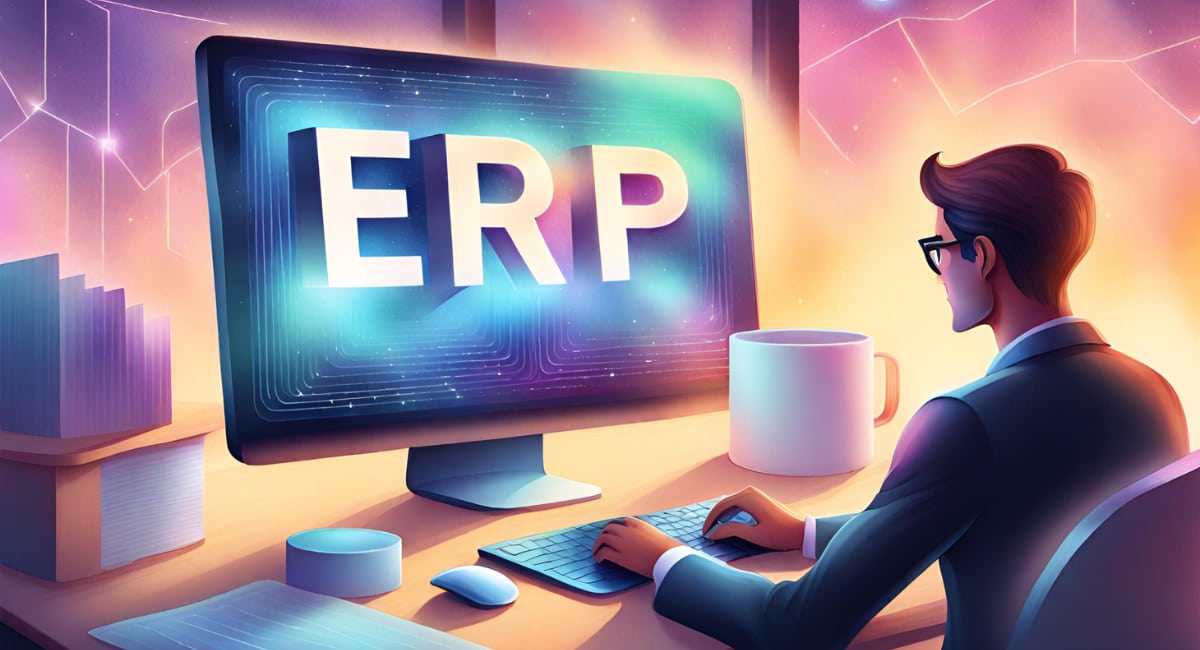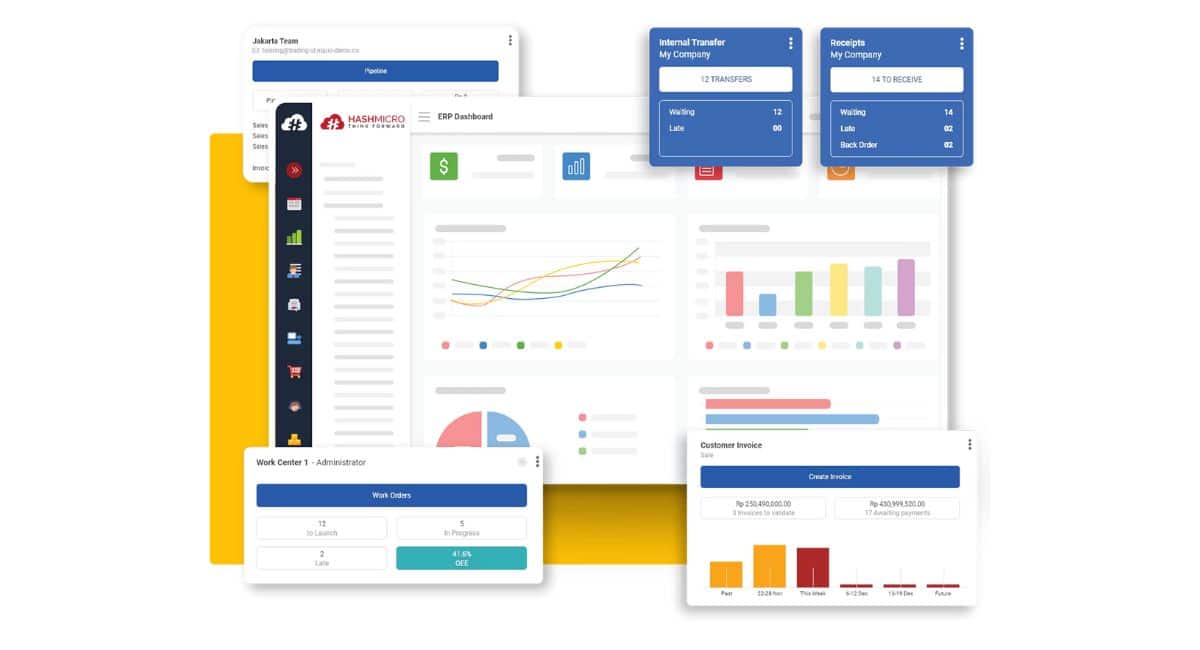In a market where efficiency equates to success, ERP solutions for real estate stand out as the catalyst for transformation within the industry. Shaping the future of real estate business management in Singapore, these comprehensive systems enable professionals to streamline real estate operations and thrive in a competitive landscape.
As the push for technological integration escalates, real estate ERP systems in Singapore are fast becoming an indispensable tool for companies looking to harness data analytics, enhance client servicing, and improve overall workflow management.
Table of Content:
Table of Content
Key Takeaways
|
Understanding ERP and Its Significance in Real Estate
In today’s competitive real estate market of Singapore, integrating comprehensive systems like enterprise resource planning (ERP) is no longer a luxury, but a necessity. ERP spans across several aspects of real estate operations, from streamlining processes to enhancing decision-making capabilities. This section explores the core concepts of ERP, its myriad benefits, and how it seamlessly integrates with daily real estate functions to pave the way for operational efficiency and robust growth.
What is ERP?
ERP, or enterprise resource planning, is a multifaceted software platform that harmonizes all the fragmented business processes within real estate. It serves as the central nervous system for a real estate enterprise, where data from sales, finance, project management, and client servicing converge to create an optimized, cohesive operating environment. The aim of deploying an ERP solution is to improve efficiency by consolidating data and processes into a single, integrated real estate solution.
Benefits of ERP Systems in Real Estate Management
- Cost Efficiency: ERP systems streamline operations and reduce the need for separate software for different tasks, thereby lowering operational costs.
- Enhanced Efficiency: By automating mundane tasks, ERP allows real estate professionals to focus on higher-level activities, improving overall productivity.
- Data-Driven Decision Making: With integrated reporting tools, enterprises can harness the power of analytics to make informed decisions.
- Improved Client Relationships: ERP provides a platform for better customer engagement and service, by centralizing client information and interactions.
How ERP Integrates with Real Estate Operations
In the realm of real estate, ERP systems are pivotal in binding together various operational threads. The integration of ERP benefits business processes in numerous ways—sales teams can access real-time inventory levels, finance can retrieve vital cost and revenue data, property managers can monitor leases and maintenance schedules, and customer service can track client interactions and feedback—each function enriched by the centralized data pool that ERP provides.
- Sales: ERP systems assist in managing sales pipelines, customer interactions, and inventory, all vital for closing deals swiftly.
- Finance: Real-time financial tracking and expense management are facilitated, ensuring compliance and fiscal health.
- Property Management: Operations such as lease management, maintenance scheduling, and asset tracking are made more efficient.
- Client Service: Enhanced access to client history and preferences enables personalized service delivery.
The adoption of integrated ERP platforms is instrumental in propelling real estate businesses toward maximized operational efficiency and a significant competitive edge in the market.
Key Features of ERP Systems for the Real Estate Sector
The implementation of a robust Enterprise Resource Planning (ERP) system can significantly enhance your real estate operations. An in-depth analysis reveals pivotal ERP features that are specially crafted to cater to the distinct requirements of the real estate sector. Let’s delve into the specifics that underline the necessity and efficiency of property management, financial reporting, and CRM in real estate, all integrated into a comprehensive ERP solution.
Property Lifecycle Management
Property lifecycle management is a cornerstone of ERP features that streamline every stage of your property portfolio. From initial acquisition, through to development, lease management, and eventual disposal, an ERP equips you with the tools to efficiently oversee these processes. The following table highlights the stages and the corresponding ERP functionalities:
| Property Lifecycle Stage | ERP Functionality |
| Acquisition | Financial assessment, due diligence tracking, document management |
| Development | Project management, budget tracking, scheduling |
| Lease Management | Lease tracking, tenant communications, renewal management |
| Maintenance | Preventive maintenance scheduling, vendor management, work order processing |
| Disposal | Asset valuation, capital gains analysis, sales processing |
Financial Management and Reporting
ERP systems in the real estate sector offer comprehensive financial management tools that are essential for maintaining fiscal health with meticulous precision. Through integrated financial reporting, you’re able to track revenue streams, manage costs, and ensure compliance with Singapore’s regulatory standards. The capability for real-time financial insights aids in strategic decision-making and long-term fiscal planning.
- Automated billing and invoicing
- Revenue and expense management
- Financial consolidation and reporting
- Regulatory compliance and audit trails
- Rent and lease accounting
Customer Relationship Management (CRM) Features
CRM in real estate is pivotal to constructing enduring customer relations. An ERP with integrated CRM capabilities ensures that customer interactions are optimized for the best possible service. Track sales opportunities, manage client information with ease, and personalize every touchpoint to enhance customer satisfaction. Crucial CRM features within your ERP system support business growth and client loyalty:
- Lead and opportunity management
- Contact and activity tracking
- Sales pipeline analysis
- Customer support and service requests
- Marketing campaign management
By leveraging the seamless intersection of property management, financial accounting, and CRM, ERP systems bring unparalleled efficiency to the real estate sector. These features ensure that you stay ahead in a competitive landscape, fostering a data-driven, customer-focused approach to real estate business management.
Selecting the Right ERP Solution for Your Real Estate Business
Embarking on the journey to choose the best ERP for real estate can seem like navigating a labyrinth. With each turn presenting a multitude of options, understanding your real estate business needs takes precedence. To aid in choosing a real estate ERP that harmonizes with your aspirations, consider this structured pathway to make an informed choice that propels your venture forward.
- Establish Your Business Objectives: Begin by sketching out the goals you aim to achieve with an ERP system, and align them with your long-term business strategy.
- Assess Your Business Processes: Take stock of your existing processes to determine what improvements are needed, ensuring the ERP can address those specific areas.
- Define Your ERP Selection Criteria: Create a tailored checklist that may include factors like integration capabilities, module offerings, and industry specialization.
- Seek Scalability and Customization: The ERP should grow as your business expands, thus, evaluate its scalability and how well it can be customized to fit your unique processes.
- User-Friendliness Matters: An ERP with an intuitive interface will reduce training time and improve user adoption rates.
- Prioritize Vendor: Evaluation: Scrutinize the track record of ERP vendors, scrutinizing their experience, support services, and after-sales assistance.
Consider formulating an ERP selection criteria matrix to systematically compare and contrast potential systems. Below is a non-exhaustive set of criteria that should be considered when choosing the right ERP:
| Selection Criteria | Description | Your Business Needs |
| Exploring the Comprehensive Functionality and Versatility of Modern Business Software Solutions | Does the ERP offer comprehensive functionalities that cover the unique aspects of real estate operations? | List down functionalities most critical to your operations. |
| Implementation and maintenance cost | Understand all costs involved, including initial setup, licenses, training, and ongoing maintenance. | Prepare a budget and consider ERP options that offer a good balance between cost and capabilities. |
| Sofware integration | The ERP should integrate seamlessly with your existing systems and any third-party applications you use. | Identify key systems that will require integration. |
| Scalability | The ERP system must support the growth of your business without significant additional investments. | Assess projected business growth over the next 5 to 10 years. |
| Customization to business needs | Gauge the extent to which the ERP can be tailored to the unique workflows of your real estate business. | Determine the level of customization you will need. |
| Support and Service | Post-implementation support is crucial for any ERP system, including training, helpdesk, and software updates. | Consider the level of support you expect and cross-verify with what vendors provide. |
| Data Security | Ensure the ERP system complies with industry standards to protect sensitive real estate data. | Review your security protocols and ensure the ERP meets or exceeds them. |
A robust decision warrants exhaustive examination, and drawing insights from your discrete comparison will illuminate the path to the best ERP software in Singapore. By meticulously addressing the outlined steps and criteria, you can cultivate a technological landscape that propels productivity and champions your business milestones.
Integrating ERP with Other Real Estate Software
The dynamic landscape of the real estate industry necessitates a harmonious blend of various software systems to optimize operations. Ensuring that your ERP forms the backbone of this technological infrastructure is pivotal to maintaining an edge in an increasingly competitive market. Let’s delve into how integrating your ERP with other software tools can significantly elevate your business efficiency.
The Role of API in ERP Integration
APIs stand as the linchpins in the quest for ERP integration within the real estate sector. They serve as the channels through which your ERP system communicates with other real estate software systems, exchanging data and commands seamlessly. The use of an API for ERP not only enhances the functionalities of your primary system but also extends its capabilities to other specialized applications you may employ, thus creating a cohesive ecosystem that is more than the sum of its parts.
Ensuring Seamless Data Flow Between Systems
Data synchronization is the heartbeat of ERP integration. In the real estate context, where every piece of data—from property listings to financial transactions—matters, it’s crucial to maintain an uninterrupted flow of information. This data fluidity supports the real-time visibility of operations, empowers data-driven decision-making, and streamlines processes across the board, leading to improved organizational performance.
Connecting ERP to CRM and Other Real Estate Tools
The CRM and ERP connection is particularly beneficial in real estate, as it bridges the gap between customer engagement and business operations. By linking these two potent tools, the insights gained from your CRM can influence strategic decision-making in the ERP. When your ERP is connected to leading real estate tools, the collective data enhances various facets of your enterprise, from sales and marketing efforts to elevated levels of customer service.
The Impact of Mobile ERP Solutions in Real Estate
In Singapore’s dynamic real estate market, embracing innovation is key to success. Mobile ERP solutions are at the forefront of this transformation, offering unprecedented flexibility and control. Beyond merely streamlining tasks, these mobile management tools have significantly changed how real estate professionals interact with data, team members, and clients. Let’s explore the various ways through which mobile ERP solutions are redefining the industry standards.
Accessing Real-Time Property Data on the Go
For real estate decision-makers, time is of the essence. With mobile ERP solutions, the latest property statistics, market trends, and vital financial data are merely a tap away. These mobile management tools enable you to assess real-time property data even when off-site, ensuring that you’re equipped with all the necessary information to make informed business decisions anytime, anywhere.
Improving Communication with Mobile ERP
Effective communication is crucial in real estate, and mobile ERP solutions excel in this domain. These platforms improve real estate communication, streamlining the flow of information between agents, clients, and other stakeholders. With mobile ERP, updates, queries, and feedback can be handled more efficiently, fostering a collaborative environment that enhances overall productivity.
Enhancing Property Viewing and Management Experience
Presenting properties in their best light and managing them with precision is paramount in the real estate business. Mobile ERP solutions augment this process, offering clients an immersive viewing experience and managers a comprehensive control over property details. From virtual tours to maintenance schedules, mobile ERP ensures that properties are showcased excellently and managed impeccably, thus expediting deals and amplifying client satisfaction.
| Feature | Traditional ERP | Mobile ERP |
| Accessibility | Limited to office use | Anywhere, anytime access |
| Data Availability | Delayed synchronization | Real-time updates |
| Client Engagement | Standard interactions | Enhanced and personalized communication |
| Property Management | On-premise activities | On-site and remote management capabilities |
| Decision Making | Time-consuming process | Quick and informed decisions |
Adopting mobile ERP solutions not only keeps you ahead of the curve in Singapore’s competitive landscape but also aligns perfectly with the evolving needs of the real estate industry. Prioritizing mobile management tools is an investment in the present and future of your business, with benefits that resonate through every level of operation.
Data Analytics and Reporting in ERP Real Estate Systems
As a strategic player in Singapore’s real estate market, harnessing the power of data analytics and ERP reporting can significantly enhance your business operations. The ability to convert raw data into actionable business insights is indicative of a well-oiled ERP system. Precision in real estate decision-making begins with the meticulous analysis and interpretation of complex datasets, leading to well-founded strategies that stand the test of market volatility.
Turning Data into Actionable Insights
Within the ecosystem of real estate data analytics, your ERP possesses the crucial function of distilling and contextualizing data to present it as clear, actionable business insights. This translates into a more nuanced understanding of customer behaviors, market trends, and financial predictions, which are indispensable for informed decision-making and driving your business forward in competitive markets.
Custom Reporting for Strategic Decision Making
Custom reporting tools in your ERP system pave the way for strategic decision-making by empowering you with curated reports. These tools take your real estate data analytics to the next level by providing detailed insights into various aspects such as sales performance, tenant retention rates, or asset management efficiency. With such powerful ERP reporting at your disposal, aligning your business strategies with real-time data becomes less an aspiration and more a reality.
Forecasting and Trend Analysis in Real Estate
The dynamic nature of Singapore’s property market demands vigilant monitoring and forecasting capabilities. Here, ERP systems shine with trend analysis features that enable you to prognosticate and navigate the future market landscape. Predictive analytics can be a game-changer, offering a foresight that helps in mitigating risks and capitalizing on potential opportunities. With solid forecasting, your business remains resilient and agile amidst the ever-evolving real estate industry.
Customization and Scalability of Real Estate ERP Solutions
As your real estate business evolves, the technology underpinning your operations must not only keep pace but also drive growth. Customizable ERP software such as HashMicro is critical, allowing you to fine-tune the system to match your company’s unique processes and workflows. With real estate business growth at the forefront of your strategic planning, investing in scalable ERP solutions is paramount to ensure seamless expansion.
Having personalized ERP features enables a coherent flow of operations, adapting to the intricate and sometimes unique needs of your real estate business. The agility to customize aspects of your ERP solution ensures that your software grows along with your business, accommodating new users and increasing transactions effortlessly.
- Customizability: Enables the ERP to evolve with your bespoke business processes.
- Scalability: Ensures the system supports growth in users, properties, and complexity of transactions.
- Personalization: Allows for the tailoring of features to the nuances of real estate tasks and client engagements.
The pursuit of scalable ERP solutions is not just a technological upgrade but a strategic choice to fuel your business’s growth curve. Address the demand for a system that is flexible yet robust, able to stand the test of time and scale alongside your expanding enterprise. The right ERP solution can be the backbone of your business, driving efficiency, facilitating new business opportunities, and providing a significant competitive edge in the fast-paced real estate sector.

Need to Know
Training and Support for Effective ERP Implementation
Transitioning to a new ERP system can be a transformative step for your real estate business in Singapore, streamlining your operations and setting the stage for future growth. However, the success of this software transition hinges on the hands that wield it. That’s why ERP training and continuous system support play critical roles in an effective ERP implementation and ongoing usage. Let’s explore how to effectively equip your team with the knowledge they need and ensure you have the support to keep your ERP system running smoothly.
Identifying the Training Needs for Your Team
Every member of your team has a unique role, necessitating a tailored approach to ERP training. Understanding the specific functions each department, from sales to finance, will handle within the ERP system is crucial. It’s not just about familiarizing everyone with the software; it’s about ensuring they can maximize the efficiency and benefits of ERP best practices within their respective job scopes. Customized training sessions should be developed to target these distinct needs, enabling a seamless transition into daily use of the new system.
Best Practices for a Smooth Transition to New Software
- Develop a comprehensive plan, clearly defining the migration process and timeline.
- Engage with stakeholders early to facilitate buy-in and address any concerns.
- Ensure data integrity by adopting proven data migration strategies.
- Minimize system downtime during the switch to reduce impact on day-to-day operations.
- Provide hands-on training sessions and simulation exercises to build confidence and proficiency.
Ongoing Support and Upgrades
The launch of your ERP system is just the beginning. As your business evolves, so too will your requirements for the ERP system. Partnering with an ERP vendor renowned for robust ERP system support ensures that you have the technical backing when challenges arise. Regular system upgrades are essential to keep pace with technological advancements, enhance security, and add new features that can further streamline real estate operations. Establishing a strong relationship with your vendor will help ensure your ERP ecosystem remains dynamic and adaptable.
Security Considerations for ERP Software in Real Estate
In today’s digital age, the real estate sector is increasingly reliant on technology for daily operations, making ERP data security an integral part of the business framework. As you integrate ERP solutions into your real estate enterprise, understanding the robust security measures, risk management strategies, and compliance standards necessary for client data protection is vital. Let’s delve into the practices that ensure secure real estate transactions and fortify the trust your clients place in your business.
Data Security Protocols and Compliance
ERP systems hold vast amounts of confidential data, making compliance with legal and regulatory standards not just necessary, but mandatory for your real estate business. To adhere to these standards, ERP systems are equipped with advanced data security protocols that include encryption, access control, and regular audits. Compliance in ERP is about safeguarding your operations from legal repercussions and simultaneously protecting sensitive client information.
Risk Management and Mitigation in ERP Systems
The potential for data breaches and cyber threats is a significant concern in real estate ERP systems. Proactive risk management features, such as real-time monitoring, threat detection, and automated alerts are crucial in mitigating potential security issues. These systems are designed to identify and address vulnerabilities swiftly, thus preventing unauthorized access and securing the integrity of your data.
Safeguarding Client Information and Transactions
Ensuring the confidentiality, integrity, and availability of client information and transactions is paramount in real estate ERP software. Integrating layers of security measures, such as multi-factor authentication, secure socket layers, and data masking, fortifies your defense against any unauthorized access. By implementing these security frameworks, your real estate transactions not only meet the highest standards of protection but also maintain and enhance the credibility and reputation of your business among stakeholders.
Cost Analysis: ROI of Investing in ERP for Real Estate
Understanding the financial impact of an ERP system on your real estate business begins with a meticulous cost-benefit analysis. By breaking down both the expenses and the anticipated returns, you’ll be able to measure the ERP investment ROI effectively. Assessing real estate ERP investment requires a balanced view of initial costs, operational efficiencies, and the potential uplift in revenue and customer satisfaction.
Laying the groundwork for an accurate ROI calculation involves several cost considerations, including:
- Upfront installation expenses
- Costs for customization to fit your specific real estate processes
- Training for your team to ensure they can leverage the ERP system to its full potential
- Ongoing maintenance and support fees
Conversely, the savings and benefits are not just about improved financial logistics but extend to the overall operational health of your business. The following are key benefits areas:
- Operational efficiencies achieved through automating and streamlining processes
- Reduced administrative overhead by eliminating redundant tasks
- Increased productivity leading to faster deal closures and revenue growth
- Heightened customer satisfaction thanks to better data management and service quality
- Competitive advantage gained from analytics-driven, strategic decision making
| Cost Component | Estimated Expense | Savings & Benefits | Net ROI Impact |
| Initial Software and Setup | $X,XXX – $XX,XXX | N/A | -$X,XXX – -$XX,XXX |
| Customization | $X,XXX – $X,XXX | Long-term Efficiency Gains | +Varies |
| Training | $X,XXX – $X,XXX | Increased User Adoption and Productivity | +Varies |
| Maintenance & Support | Annual Fee $X,XXX – $X,XXX | Reduced Downtime and IT Costs | +Varies |
| Operational Efficiency | Varies | Reduced Operating Costs by X% | +Varies |
| Revenue Growth | Varies | Increased Transactions & Margins | +Varies |
| Customer Satisfaction | Varies | Improved Client Retention Rates | +Varies |
To further illustrate the financial impact of ERP on real estate businesses, let’s dive deeper into cost-saving mechanisms. Automating lead management and property listings can save numerous working hours, translating directly into cost savings. Similarly, an ERP’s robust reporting tools can reduce the time and resources spent on compiling financial reports and compliance documentation.
Quantifying the less tangible benefits, like customer satisfaction, may seem challenging, but consider metrics like customer retention rates, Net Promoter Scores, and positive online reviews, all of which can correlate strongly with profitable, growth-oriented business practices enabled by a comprehensive ERP system.
In summary, a thorough cost-benefit analysis of your real estate ERP investment should emphasize the larger picture—the ultimate ROI transcends the ledger, influencing everything from internal efficiency to external market strength. By embracing these insights, you’re not just investing in software but pioneering a transformative approach to your real estate business operations in Singapore.
Conclusion
The integration of Enterprise Resource Planning (ERP) systems within the real estate industry represents a significant leap towards operational excellence. By adopting not just any ERP system, but the best ERP software for real estate, professionals in Singapore can leverage coordinated workflows, enhance client interactions, and streamline administrative and financial tasks. These enhancements are not merely amenities but necessities in an era where technological advancements in real estate are essential for maintaining competitiveness.
To those steering real estate enterprises in Singapore, the decision to embrace an ERP system should be seen as an investment into the core foundation of your business operations. HashMicro is one of the best real estate ERP in Singapore, with complete features and modules. Grab the chance to transform your business by trying the free demo!




























































